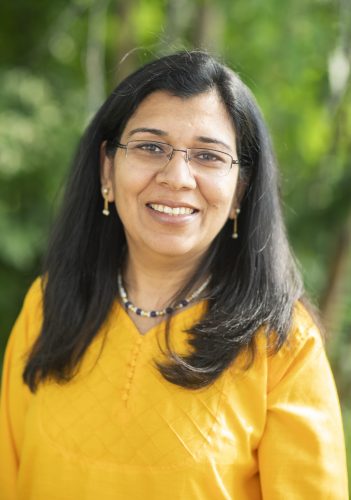Friday Focus: No one guru
July 15, 2021

— by Anupma Prakash, provost and executive vice chancellor
Growing up in a Hindu family, the importance of a “guru” in one’s life was instilled in my mind for as long as I can remember. Guru is a Sanskrit word that means a wise person whose role is to impart knowledge and dispel ignorance. In those impressionable early years, my mental image of a guru was narrowly restricted to an old saffron-clad, bearded male, someone who would read and explain religious scriptures. I recognize now the flaws in having stereotype images and labels associated with words.
My wisdom did not come from one guru or priest. It came from many people who I shared parts of my life’s journey with, and I consider each of them a guru. Some were there for a short time, and some for a long time, but each person taught me something valuable. The maid, whom I lovingly called “amma” and who told me bedtime stories, was one of my early gurus; she taught me the importance of unconditional love and respect for all.
My grandmother was a powerful guru and influencer. Her understanding of human behavior rivaled that of someone with an advanced psychology degree. She would look at me once, and would know if I had a rough day. She would follow up with the right questions and by the time we were done talking, life always felt good. She taught me the importance of being there, listening and caring.
My parents taught me to focus on “karma'' (my work) and not to worry about the “phal” (fruit, or the result of the work), a concept that is also deeply rooted in Hindu philosophy. I benefited from the experiences and counsel of numerous wise elders.
Whereas my upbringing grounded me with strong values and identity, leaving home to live first in Europe and now raise a family in the U.S. exposed me to a diversity of lifestyles, cultures and experiences that widened my perspectives. It made me recognize the strengths and shortcomings of my upbringing. As an example, in my desire to respect my elders, I often suppressed my urge to question and debate with them.
On the other hand, my children, who grew up in a system that promotes active questioning, brought their perspectives in our conversations from an early age. Talks about racial inequities, pride month, setting boundaries, mental health and social stigma are a part of our everyday dinner conversation. It took time to unlearn and recognize that their arguments are an expression of their perspectives that are in turn a reflection of a very different socio-cultural context. My children are a part of a generation that is growing up with so much information at their fingertips. This generation is innately wise and capable, and we have a lot to learn from them. They are our gurus who help us unlearn things that may stop us from expanding our horizons.
I feel fortunate that I work at a university where I have the opportunity to interact with many students on a daily basis, learn from them, and then implement changes to modernize our learning environment and make it contemporary and relevant for our youth and the future workforce.
I am grateful to all my gurus, including the elders who gave me the foundational values I live my life with, my colleagues and friends who share their wisdom constantly with me, and the youth who continue to help me learn and grow as an individual. THANK YOU for your role in shaping my life.
Friday Focus is a column written by a different member of UAF’s leadership team every week. On occasion, a guest writer is invited to contribute a column.


